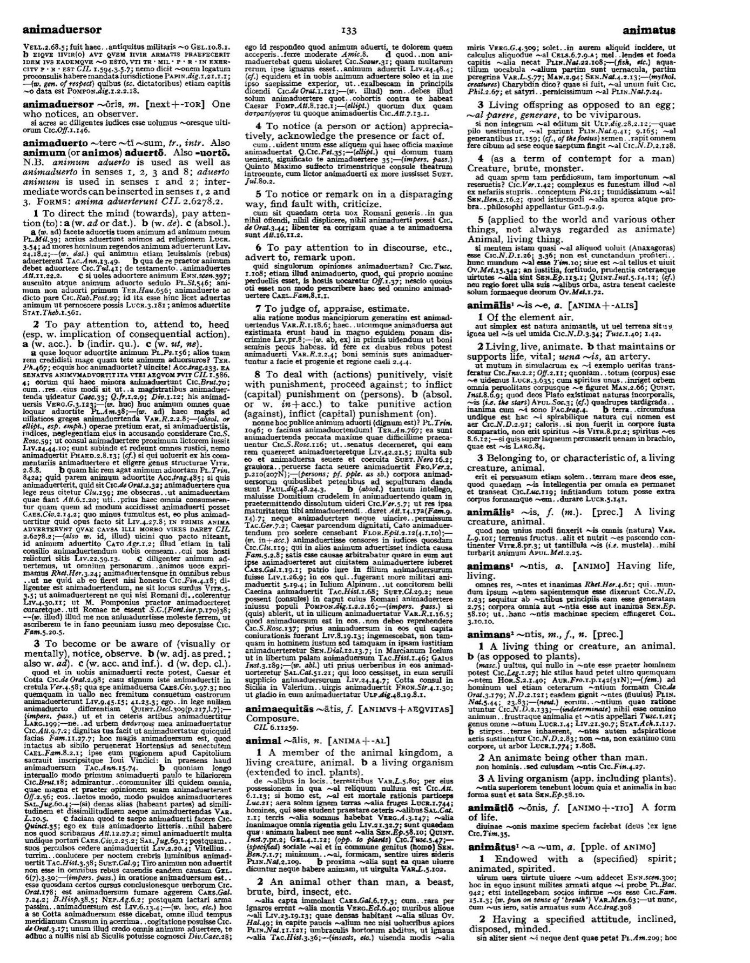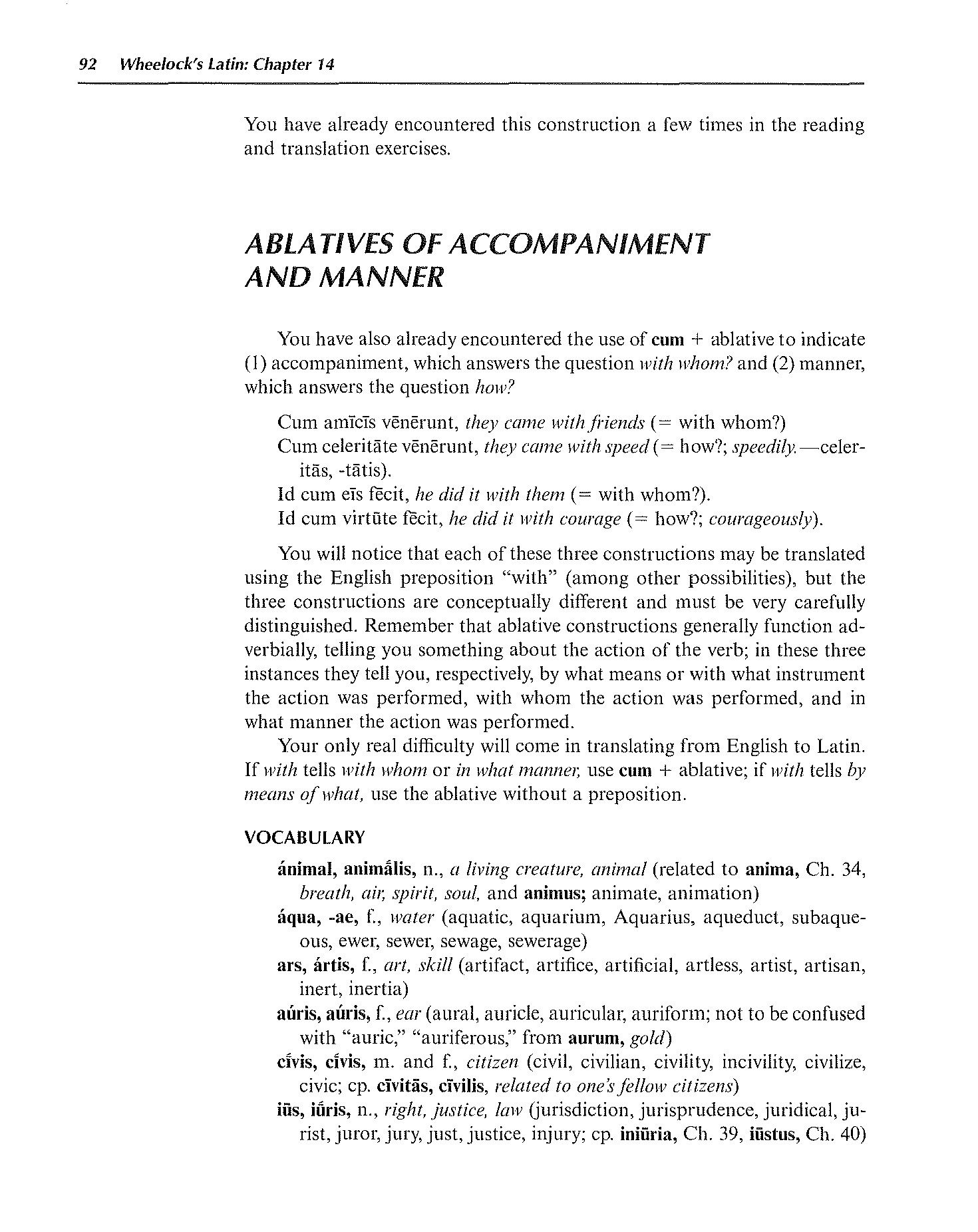
page_listing.tpl
page_subListingDetails.tpl
sub_listingDetails_style1.tpl
sub_listingDetails.title.tpl
animal living creature
animal is a Latin Noun that primarily means living creature.
Definitions for animal
Wheelock's Latin
Noun
- 1
a living creature, animal
English derivatives:
anima animate animation
Oxford Latin Dictionary
Noun
- 1
A member of the animal kingdom, a living creature, animal. (b) a living organism (extended to incl. plants).
- 2
An animal other than man, a beast, brute, bird, insect, etc.
- 3
Living offspring as opposed to an egg; to be viviparous.
Sentences with animal
Latin to English
Illa animālia multōs hominēs in mare trāxērunt.Compare Those animals dragged many men into the sea.
In omnī marī haec duo animālia potentia inveniēbāmus.Compare In every sea we kept finding these two powerful animals.
Quam multa animalia hoc primum cognovimus saeculo, quam multa negotia ne hoc quidem! Multa venientis aevi populus ignota nobis sciet; multa saeculis tunc futuris cum memoria nostri exoleverit resevantur. Pusilla res mundus est, nisi in illo quod quaertat omnis mundus habeat.Compare How many animals we have come to know for the first time in our own days! Many, too, that are unknown to us, the people of a coming day will know. Many discoveries are reserved for the ages to be, when our memory shall have perished. The world would be a puny thing if future ages found in it nothing to investigate.
Declension table for animal
Cactus2000
| Singular | Plural | |
| Nom. | animal | animālia |
| Gen. | animālis | animālium |
| Dat. | animālī | animālibus |
| Acc. | animal | animālia |
| Abl. | animālī | animālibus |
Data sources
Notes
- Definitions
- Frederick M. Wheelock, Wheelock's Latin, 6th ed., rev. Richard A. LaFleur (New York, NY: HarperCollins Publishers, 2005): 92.
- P. G. W. Glare, Oxford Latin Dictionary, Vols. 1-8 (Oxford: Clarendon Press, 1982): 133.
- Word frequencies
- Christopher Francese, "Latin Core Vocabulary," Dickinson College Commentaries, last modified 2014, http://dcc.dickinson.edu.
- Paul B. Diederich, The Frequency of Latin Words and Their Endings, PhD diss., (Columbia University, 1939).
- Louis Delatte, Suzanne Govaerts, Joseph Denooz, and Etienne Evrard, Dictionnaire fréquentiel et index inverse de la langue latine [Frequency Dictionary and Inverse Index of the Latin Language] (Liège, Belgium: Laboratoire d'analyse statistique des langues anciennes de l'Université de Liège [L.A.S.L.A.], 1981): 121.
Bibliography
Allen, Joseph H. Allen and Greenough's New Latin Grammar for Schools and Colleges: Founded on Comparative Grammar. Edited by James B. Greenough, George L. Kittredge, Albert A. Howard, and Benjamin L. D'Ooge. Boston, MA: Ginn & Company, 1903.
Crystal, David. A Dictionary of Linguistics and Phonetics. 6th ed. Oxford, UK: Blackwell Publishing, 2008.
Delatte, Louis, Suzanne Govaerts, Joseph Denooz, and Etienne Evrard. Dictionnaire fréquentiel et index inverse de la langue latine [Frequency Dictionary and Inverse Index of the Latin Language]. Liège, Belgium: Laboratoire d'analyse statistique des langues anciennes de l'Université de Liège (L.A.S.L.A.), 1981.
Diederich, Paul B. The Frequency of Latin Words and Their Endings. PhD diss., Columbia University, 1939.
Francese, Christopher. "Latin Core Vocabulary." Dickinson College Commentaries. Last modified 2014. http://dcc.dickinson.edu/latin-vocabulary-list.
Gildersleeve, Basil L., and Gonzales Lodge. Gildersleeve's Latin Grammar: Third Edition, Revised, and Enlarged. 3rd ed. London, England: Macmillan and Co., 1903.
Glare, Peter G.W. Oxford Latin Dictionary. Vols. 1-8. Oxford, England: Clarendon Press, 1982.
Krüger, Bernd. "Latin Conjugation Tables." Cactus2000. Accessed May 5, 2023. https://latin.cactus2000.de/index.en.php.
Pierson, Nick. "Sound of Text." Accessed October 26, 2019. https://soundoftext.com.
Wheelock, Frederick M. Wheelock's Latin. 6th ed. Revised by Richard A. LaFleur. New York, NY: HarperCollins Publishers, 2005.
Wiktionary Contributors. "Victionarium." Wikimedia Foundation, Inc. Updated March 18, 2019. https://la.wiktionary.org/wiki/Victionarium:Pagina_prima.
Citation
Chicago (17th ed.)
Allo Contributors. "animal, animālis (n.) - Latin Word Definition." Allo Latin Dictionary. Last modified . Accessed February 19, 2026. http://ancientlanguages.org/latin/dictionary/animal-animalis.
Entry created on . Last updated on .







